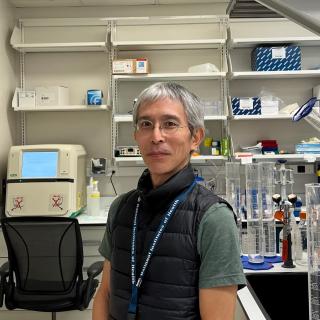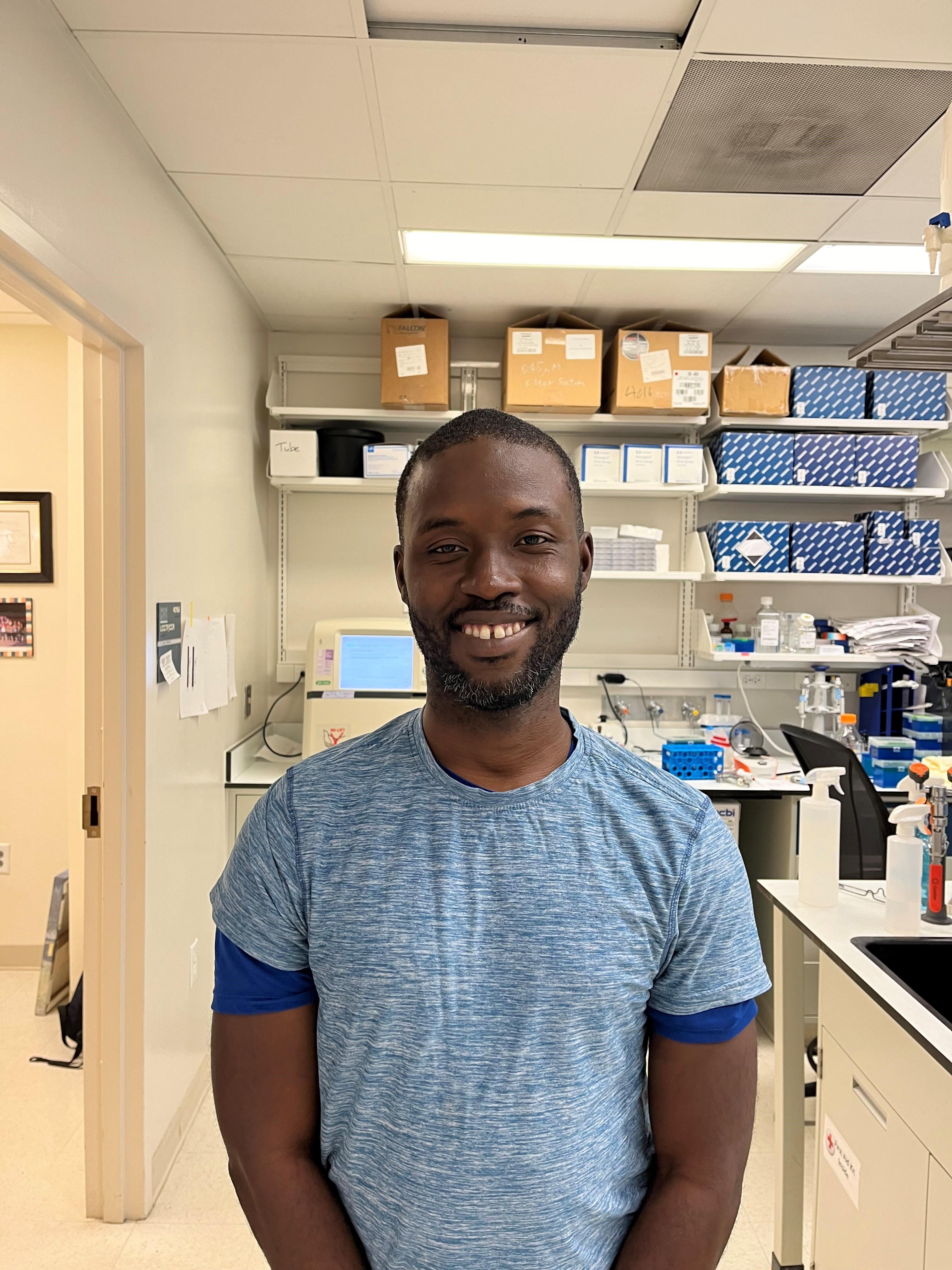
Urbain Weyemi, Ph.D.
- Center for Cancer Research
- National Cancer Institute
- Building 37, Room 4016A
- Bethesda, MD 20892
- 240-760-6363
- urbain.weyemi@nih.gov
RESEARCH SUMMARY
Dr. Weyemi is a molecular biologist who investigates the link between genomic instability and redox metabolism in human diseases. His laboratory uses genomics tools and mouse models to map cellular and redox metabolic changes associated with genomic instability in tumor cells. Dr. Weyemi’s ultimate goal is to improve the understanding of cancer biology and to discover effective therapeutic targets.
Areas of Expertise

Urbain Weyemi, Ph.D.
Research
Mammalian cells are endowed with a number of tightly regulated pathways that provide efficient DNA repair in response to internal or external agents that cause chromosomal or genomic damage. Issues in DNA repair processes or the accumulation of mutation loads can lead to a broad range of human diseases, including those related to immune deficiency, cancer, inflammation, aging and developmental disorders affecting the nervous system.
Preventing genomic instability (the tendency for DNA mutations to occur during cell division) is important for development, health and survival. Mounting evidence points to an emerging dialogue between genomic stability and metabolic pathways.
Our laboratory explores the interplay between genomic instability and metabolism, mitochondrial functions, and redox homeostasis in human diseases, particularly in cancer and neurodegeneration. Our goal is to uncover pathways that coordinate DNA repair responses and metabolism in cancer and neurodegeneration.
We have previously demonstrated that mitigation of reactive oxygen species (ROS) reduced the severity of the major features of Ataxia Telangiectasia disease (A-T). Recently, we published the first comprehensive studies demonstrating that mice lacking DNA repair histone H2AX experience oxidative stress, due to the repression of NRF2-regulated antioxidant genes, and to dysfunctional mitochondria. In a parallel study, we unveiled a novel role for histone H2AX in epithelial to mesenchymal transition and metastasis.
1. Investigate the relationship between DNA repair responses and metabolic pathways in solid tumors
Goal: Using metabolism-centered CRISPR screens, we aim to understand how ataxia-telangiectasia mutated (ATM) kinase cooperates with various metabolic pathways to affect cancer progression and resistance to therapy.
ATM kinase controls DNA damage responses upon DNA double-strand break formation. Loss of ATM kinase activity or the presence of pathogenic ATM gene variants increases cancer risks. Indeed, ATM is frequently mutated across cancer types. However, ATM genetic deficiency or inhibition can also be harnessed to sensitize cancer cells to radiotherapy.
There is increasing evidence that ATM controls several important metabolic pathways, including mitochondrial respiration, the pentose phosphate pathway, and redox homeostasis, all of which help metastatic cancer cells survive in nutrient-poor tumor microenvironments. Notably, metastatic breast cancer cells have been demonstrated to heavily rely on these pathways.
However, there are major gaps in our understanding of how ATM controls various metabolic pathways. Filling these gaps will open up new strategies for targeted therapies so desperately needed to treat highly metastatic cancers.
2. Elucidate how genomic stability controls energetic mitochondrial metabolism
Goal: Using metabolism-centered CRISPR screens, we aim to understand how genomic stability controls energetic mitochondrial metabolism.
Cells with defects in DNA repair exhibit significant alterations in genes involved in mitochondrial biogenesis as well as impaired energy metabolism due to higher levels of PARylation and subsequent depletion of NAD+ following DNA damage.
Notably, the combined effects of changes in mitochondrial activity and increased genomic instability during aging create an environment prone to the development of a wide range of neurodegenerative disorders, including Alzheimer’s and Parkinson’s diseases. In addition, this combination is particularly prominent in metastatic cancer cells.
We are using metabolism-centered CRISPR screens to access how genomic stability controls mitochondrial homeostasis and how this process can promote cancer cell survival.
Biography

Urbain Weyemi, Ph.D.
Dr. Weyemi was born and raised in Benin, West Africa. He subsequently moved to Paris, France for graduate studies, receiving his master’s and Ph.D. degrees in molecular biology from Paris-Sud University. His thesis research focused on the nexus of oncogenic activation, redox homeostasis, and DNA damage responses in cancer.
He conducted postdoctoral research, first at the NCI under Dr. William M. Bonner, focusing on redox homeostasis and genomic instability in cancer, and then at the Johns Hopkins University School of Medicine in the laboratory of Dr. Solomon H. Snyder where his work unveiled a novel role for the DNA repair histone H2AX in neuronal health and mitochondrial homeostasis.
Dr. Weyemi joined the University of Texas at Austin in 2020 as an assistant professor and a CPRIT scholar in the Department of Molecular Biosciences, where he established an independent research group. He was selected as one of the 16 American Sloan Research Fellows in Neuroscience in 2021 for his research on the role of genomic instability and mitochondrial dysfunction in neurodegeneration. Dr. Weyemi joined the Developmental Therapeutics Branch in 2022 as a Stadtman Investigator.
He serves on the Editorial Board of eLife and Molecular Carcinogenesis.
Honors and Awards
April 2022 NIH Distinguished Scholar
June 2021 2021 Alfred P. Sloan Research Fellow
2019 Cancer Prevention & Research Institute of Texas (CPRIT) Scholar
2019 The American Society for Cell Biology ACT Award (funded by NIH)
2018 The American Society for Cell Biology FRED Award (funded by NSF)
2014 NIH Fellow Award for Research Excellence (FARE 2014)
2013 NIH Fellow Award for Research Excellence (FARE 2013)
2009 French Foundation for Medical Research Award (FRM), France
2006 Department of Research and Education Graduate Studies Award, France
Publications
- Bibliography Link
- View Dr. Weyemi's NCBI Bibliography.
- View Dr. Weyemi's Google Scholar Page.
CRISPR metabolic screen identifies ATM and KEAP1 as targetable genetic vulnerabilities in solid tumors
NADPH oxidase 4 is a critical mediator in Ataxia telangiectasia disease
Metabolic dependency mapping identifies Peroxiredoxin 1 as a driver of resistance to ATM inhibition
Unraveling the nexus: Genomic instability and metabolism in cancer.
Job Vacancies
We have no open positions in our group at this time, please check back later.
To see all available positions at CCR, take a look at our Careers page. You can also subscribe to receive CCR's latest job and training opportunities in your inbox.
News
Learn more about CCR research advances, new discoveries and more
on our news section.
Team
Lab Life
SUMMER 2023








